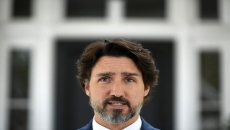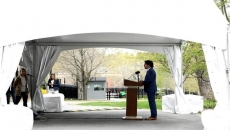As the Liberal government expands the financial supports designed to blunt the impact of the COVID-19 pandemic, NDP Leader Jagmeet Singh says his party wants more transparency on where those dollars are going.
Singh said Wednesday that's what is driving his party's point of view in talks underway now to determine in what form Parliament may or may not return next week.
"We want to make sure that money that is being put out by the government goes directly to workers, that it is tied to jobs, that it is tied to employment," he said.
"To do that we need to get back to a more normal operation of Parliament."
A special COVID-19 committee is due to meet in person later Wednesday; its tri-weekly meetings are now the stand-in for Parliament, which has been largely adjourned since the outbreak of the COVID-19 pandemic in Canada in March.
But the pause on normal parliamentary proceedings is set to expire on Monday, unless the four parties in the House of Commons can come to some kind of agreement on how to extend it.
Singh said his party is still fine-tuning its proposal for the talks, but the New Democrats are eyeing a hybrid model similar to what is now being used in the U.K. It allows for MPs to attend either virtually or in person, allowing for participation from those across the country.
"The principle that we would want to operate on is that MPs are not limited from their access to representing their constituents so that they are able to be in some way representing their people, the people that elected them," he said.
The Conservatives also support the hybrid approach, which Singh said has been presented as an option to the Speaker of the House of Commons.
Bloc Quebecois Leader Yves-Francois Blanchet said he thinks a deal can be reached, but he has given the Liberals a list of demands before his party will agree to any modifications to the plan for Parliament.
He said Wednesday his party is looking for improvements to a number of existing support programs, among them those that help with businesses' fixed costs, as well as the commercial rent subsidy. He also wants the Canada Emergency Response Benefit and student aid programs amended so recipients can also take jobs.
"We don't want the government to say, 'Oh yes, we're going to do it,' " Blanchet said.
"We want the government to say, 'This is what we're going to do, this is when, this how, and this is how much it is going to cost.' And in that case we'll say OK, now you're being true to your word."
Both the Commons and Senate have met several times to pass emergency aid legislation, doing so in single-day sittings with close to the minimum number of members required under the procedural rules of Parliament.
There are a handful of House of Commons committees still meeting as well, entirely virtually.
The current special committee meets twice a week virtually, and once in person.
Trudeau has suggested he prefers a continuation of that approach, leaving the door open to additional weekly virtual sittings.
A review of the minutes from the first six meetings reveals that Scheer has attended three, while Trudeau, Singh and Blanchet have all attended four.
Blanchet said if MPs are going to continue in-person sittings, there needs to be enforcement of the number of MPs present to keep everyone safe.
He said Wednesday his party isn't committed to any particular approach for a return. There are about four more weeks of Parliament before the scheduled summer break, he said.
"So maybe the easier solution would be the best," he said
"I feel the easiest solution is making a strong and trustworthy agreement to go on as we do now but if we do not, it's pretty easy also to be here five days a week but in a very limited number of MPs."






